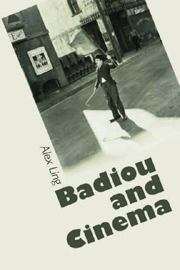Book contents
- Frontmatter
- Contents
- Acknowledgements
- Abbreviations of Frequently Cited Texts
- Introduction: Gorky's Maxim
- 1 Presenting Alain Badiou
- 2 Can Cinema be Thought?
- 3 In the Kingdom of Shadows
- 4 An Aesthetic of Truth
- 5 An Instant or an Eternity: Thinking Cinema After Deleuze
- 6 Alain Resnais and the Mise en Scène of Two
- 7 The Castle of Impurity
- Conclusion: The Future of an Illusion
- Bibliography
- Filmography
- Index
4 - An Aesthetic of Truth
Published online by Cambridge University Press: 12 September 2012
- Frontmatter
- Contents
- Acknowledgements
- Abbreviations of Frequently Cited Texts
- Introduction: Gorky's Maxim
- 1 Presenting Alain Badiou
- 2 Can Cinema be Thought?
- 3 In the Kingdom of Shadows
- 4 An Aesthetic of Truth
- 5 An Instant or an Eternity: Thinking Cinema After Deleuze
- 6 Alain Resnais and the Mise en Scène of Two
- 7 The Castle of Impurity
- Conclusion: The Future of an Illusion
- Bibliography
- Filmography
- Index
Summary
To have a regard for reality does not mean that what one does in fact is pile up appearances. On the contrary, it means that one strips the appearances of all that is not essential, in order to get at the totality in all its simplicity.
André BazinThe world pulled over our eyes
Reject everything about the real that does not become true.
Robert BressonBadiou begins his paper on science fiction cinema, ‘Dialectiques de la fable’, by noting how it is imperative that we:
always verify, against empiricism and with Platonism, that the visible, apparent face of what is certain (like Saint Thomas, we must see to believe), is in reality only a particular aleatory index of the real. And consequently, in the cinema: verify that this artifice – cinema – seriously tests philosophy by imposing a variation of the regime of the sensible. In sum, verify that cinema has at its disposal a certain aptitude for the concept, whence it has the power of making visibly uncertain the certainty of the visible. Or again: of showing that the image is only a semblance, or even a semblance of image.
(DF, p. 120)Accepting Badiou's challenge clearly involves further investigation of cinema's peculiar standing as an onto-logical art. While this is what I have by and large already attempted in my reading of Film, our study here will not focus on any such instance of ‘arthouse’ cinema. Nor will it entail any Bazin-esque recourse to documentary or classical ‘realist’ cinema.
- Type
- Chapter
- Information
- Badiou and Cinema , pp. 85 - 106Publisher: Edinburgh University PressPrint publication year: 2010



